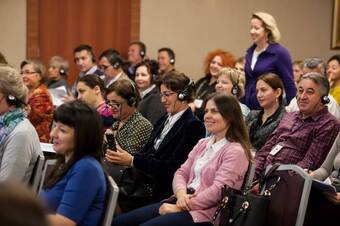2nd Annual Conference in South East Europe “Inclusive Education in Practice”
28-29 October 2014, Zagreb, Croatia
“Inclusive education in practice in South East Europe” – what is the reality and what progress is possible?
 It has become clear that the principle of inclusiveness demands not simply an adjustment of the education system, but its thorough overhaul and a comprehensive reform of the school itself. Inclusive schools are the foundation of inclusive and socially just societies.
It has become clear that the principle of inclusiveness demands not simply an adjustment of the education system, but its thorough overhaul and a comprehensive reform of the school itself. Inclusive schools are the foundation of inclusive and socially just societies.
The levels of achievement of inclusiveness in education vary slightly from country to country across South East Europe, the seven beneficiaries involved in the project all face similar problems and challenges.
These are just some of the conclusions to emerge from a stimulating and at times heated discussion at a two-day conference organised by the Project in Zagreb at the end of October.
The achievements over the past year – notably the creation of SchoolNet, TeacherNet and PolicyNet were highlighted as was the baseline study in which around 10,000 students participated. The interesting fact emerged that often school authorities (teachers and principals) regarded their schools as more inclusive than did parents and students.
In a panel discussion on “Practising inclusion in schools”, a broad picture of inclusive education practices across the South East Europe region emerged, based on research conducted and reports from pilot schools. This included:
- the fact that most pilot schools do lack a comprehensive and consistent strategy/ policy for inclusion;
- that primary schools are more inclusive than VET schools and gymnasiums;
- in multiethnic schools, with large numbers of migrant students, prevention of violence and creation of a friendly inclusive environment are priority tasks.
- local communities are not sufficiently involved in helping schools achieve inclusiveness in their practices.
- pedagogical assistants and psychologists are needed in schools to guide and assist students with learning difficulties, but school budgets do not allow for them.
The second day of the conference included a discussion of the regional PolicyNet recommendations which provoked lively discussion with a number of specific steps suggested to accelerate and improve the policy-making process.
An important part of the regional conference was the final discussion devoted to the future of inclusive education in the region and what could and should be done to enhance it. The specific situation of Roma children was touched on and the positive steps being taken by some Beneficiaries to address this. Another major concern is VET and the urgent need to improve it to address labour market imbalances.
At the conclusion the participants suggested a number of ways for their respective ministries of education to contribute to regional efforts. They include:
- implement all tools and documents developed by the project;
- make use of all resources available in the country;
- incorporate the project achievements and good practices into the development of relevant guidelines and regulations;
- exchange information and ideas, share lessons learnt and problems overcome; be open for visits of colleagues from other countries;
- participate in awareness raising campaigns across the region, supply success stories of implementing inclusiveness to the media, inform general public about the project’s objectives and activities;
- support continuous teachers’ education, share developed training modules, manuals and guidelines;
- contribute to the development of monitoring and evaluation framework for schools;
- improve schools’ infrastructure, contribute to the creation of enabling environment for all students;
- support schools in their cooperation with local governments;
- facilitate regional networking of students by organising regional sports competitions, summer camps for students and teachers, etc.
Documents from the Conference
SESSION 1: Regional support for inclusive education: What progress has been made?
Ms Vesna Atanasova, Council of Europe: Status of implementation of Joint Project on Inclusive Education: Challenges and Opportunities for the three regional Networks (School, Teacher and Policy Net)
Mr William Bartlett, The European Institute, London School of Economics (LSE) Perception of inclusiveness and Index for Inclusion of the SchoolNet
Ms Lana Jurko, Network of Education Policy Centres Support to SchoolNet for implementing inclusive policies and practices
Ms Judith Hollenweger, Zurich University of Teacher Education Mapping of existing inclusive teacher training programmes for TeacherNet
SESSION 2: Inclusion: how does it work in schools? - Panel discussion
Ms Maria Golubeva, Education Policy Expert Links Between Policy and Practice
SESSION 3: Regional PolicyNet recommendations in line with the Beneficiaries commitment to EU accession. Panel discussion, PolicyNet per thematic groups (primary, secondary and VET)
Ms Radmila Rangelov Jusović, Center for Educational Initiatives Step by Step Introduction to Session 3
Ms Tamara Milić, Ministry of Education and Sports of Montenegro
Mr Estevan Ikonomi, National Association of Social Workers (Albania)
PolicyNet: working Group Processes and Draft Recommendations
SESSION 4: Panel discussion: Inclusive education in the region: the future
Ms Lida Kita, European Training Foundation Introduction to Session 4
Mr Aleksa Bjeliš - Council of Europe Steering Committee for Educational Policy and Practice Remarks of Behalf of the CDPPE
Panellists: Steering Board members
Ms Tatjana Vuçani (Albania)
Ms Lejla Divović (Bosnia and Herzegovina)
Ms Nada Jakir (Croatia)
Ms Vesna Vučurović (Montenegro)
Ms Snežana Vuković (Serbia)
Ms Natasha Janevska (“the former Yugoslav Republic of Macedonia”)
Ms Lulavere Behluli (Kosovo*)
Evaluations
* This designation is without prejudice to positions on status and is in line with UNSC 1244 and the ICJ opinion on the Kosovo Declaration of Independence.

















